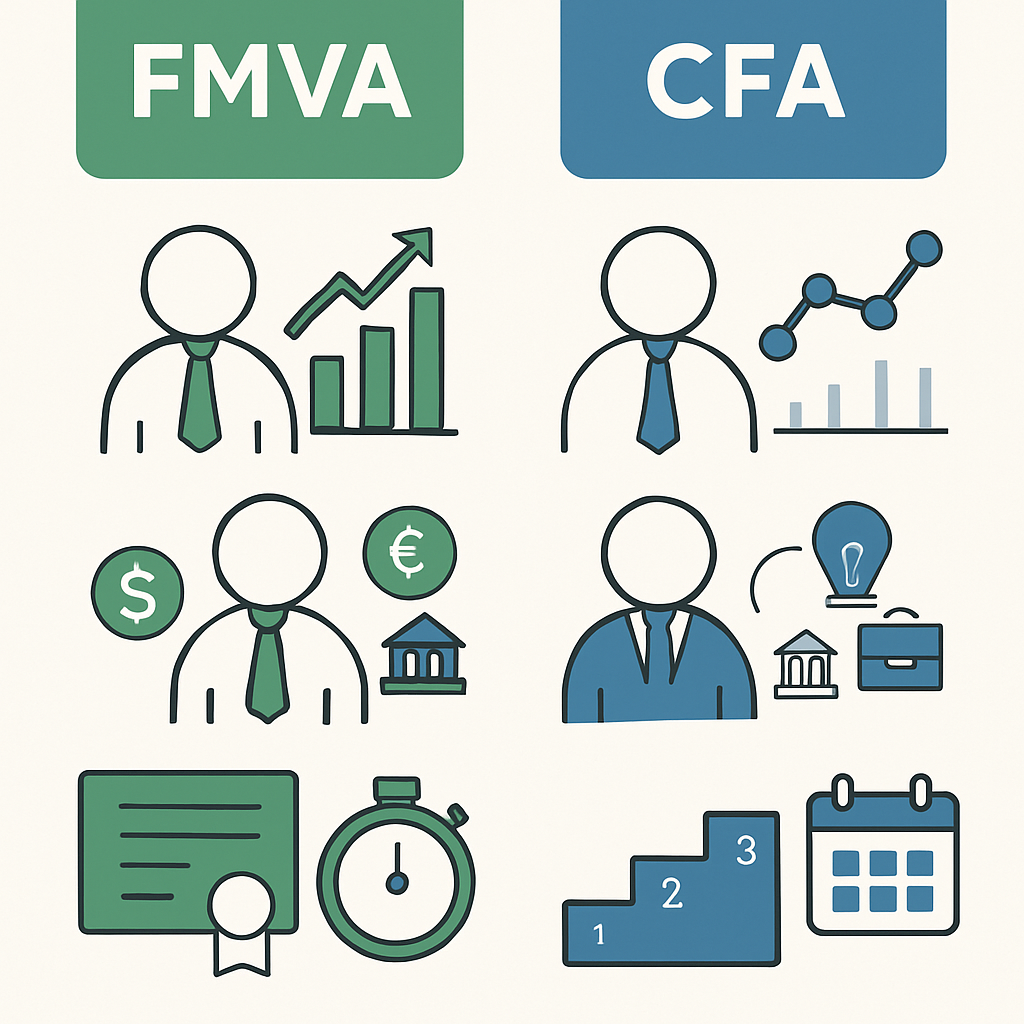How to Choose Between FMVA and CFA: Key Differences, Career Outcomes & Certification Paths
How to Choose Between FMVA and CFA: Key Differences, Career Outcomes & Certification Paths

Accounting
When advancing your career in finance, choosing the right certification can have a major impact on your professional journey. Two of the most popular and respected credentials in the financial world are the Certified Financial Analyst (CFA) and the Financial Modeling & Valuation Analyst (FMVA). While both certifications enhance financial expertise, they serve different career goals and industries. In this article, we will explore the core differences between FMVA and CFA, their respective benefits, requirements, and how to determine which one aligns best with your career aspirations.
What is the CFA Certification?
The Chartered Financial Analyst (CFA) designation is a globally recognized credential offered by the CFA Institute. It is regarded as one of the most prestigious certifications in investment management and financial analysis. The CFA program focuses on a broad range of financial topics, including investment analysis, portfolio management, ethics, and economics.
The CFA program consists of three levels (Level I, II, and III), each progressively more challenging. Candidates must pass all levels, hold a bachelor’s degree (or be in the final year of study), and acquire at least four years of qualified work experience to earn the charter.
CFA holders often pursue careers in investment banking, equity research, portfolio management, and financial consulting.
What is the FMVA Certification?
The Financial Modeling & Valuation Analyst (FMVA) certification is offered by the Corporate Finance Institute (CFI). This program is designed to equip finance professionals with practical skills in financial modeling, valuation, budgeting, forecasting, and Excel.
Unlike the CFA, the FMVA focuses more on hands-on, job-ready skills. It is a self-paced online program that includes over 20 courses and final assessments. The FMVA is ideal for professionals working in corporate finance, investment banking, financial planning & analysis (FP&A), and business strategy.
The program does not require prior experience or academic prerequisites, making it accessible to a wide range of learners.
FMVA vs CFA: Key Differences
To understand which credential best suits your career path, let’s break down the major differences across multiple dimensions:
-
Focus Area
-
CFA: Primarily emphasizes investment management, financial ethics, equity/fixed-income analysis, and portfolio management.
-
FMVA: Centers around financial modeling, corporate finance, valuation, budgeting, and Excel-based analysis.
-
Learning Format & Duration
-
CFA: Traditional structure with strict exam schedules, taking 2.5 to 4 years on average to complete all levels.
-
FMVA: Self-paced online learning that can be completed in 6 months to 1 year, depending on the learner’s speed.
-
Exam Structure
-
CFA: Three levels of proctored exams (6 hours each), with multiple-choice questions, item sets, and essay-type responses.
-
FMVA: Multiple module quizzes and a final comprehensive exam (typically completed online).
-
Time & Financial Investment
-
CFA: Requires thousands of study hours across multiple years. Costs can range between $2,500 to $5,000 depending on enrollment and preparation resources.
-
FMVA: Can be completed in under a year. Costs around $500 - $1,000, including all study materials.
-
Career Path
-
CFA: Ideal for careers in asset management, hedge funds, investment banking, wealth management, and equity research.
-
FMVA: Suitable for corporate finance, FP&A roles, private equity, consulting, and business development.
-
Recognition & Reputation
-
CFA: Globally recognized with high prestige, especially in investment and asset management sectors.
-
FMVA: Growing recognition in corporate finance and investment banking due to its practical relevance.
Which Certification is Right for You?
Choosing between FMVA and CFA depends on your career goals, learning preferences, and the industries you wish to enter.
Choose CFA if you:
-
Aspire to work in investment banking, portfolio management, or equity research.
-
Are looking for a globally prestigious credential.
-
Are committed to a long-term learning journey with in-depth theoretical knowledge.
Choose FMVA if you:
-
Want practical, job-ready skills in financial modeling and valuation.
-
Prefer flexible, self-paced online learning.
-
Work or plan to work in corporate finance, FP&A, or strategy departments.
FMVA + CFA: Can You Pursue Both?
Many finance professionals opt to pursue both credentials to gain a competitive edge. While the CFA provides a strong foundation in financial theory and investment analysis, the FMVA offers practical modeling skills that are directly applicable to day-to-day financial work.
Pursuing both can open opportunities in a broader set of roles—from investment research to financial planning and business valuation—making you a well-rounded finance professional.
Salary Comparison: FMVA vs CFA
While salaries vary by industry, experience, and geography, here’s a general comparison:
-
CFA Charterholders:
-
Entry-Level: $70,000 – $100,000
-
Mid-Level: $100,000 – $150,000
-
Senior/Executive: $150,000 – $300,000+
-
FMVA Holders:
-
Entry-Level: $60,000 – $90,000
-
Mid-Level: $90,000 – $130,000
-
Senior/Executive: $130,000 – $200,000+
FMVA salaries may be slightly lower than CFA in investment-centric roles but are competitive in corporate finance and consulting.
Global Recognition and Industry Use
CFA:
-
Globally respected in over 160 countries.
-
Highly valued in capital markets, asset management, and banking.
FMVA:
-
Increasingly recognized in the corporate finance world.
-
Used by professionals in Fortune 500 companies, investment firms, and start-ups.
Both credentials hold value, but CFA may offer wider global mobility, while FMVA provides quicker access to practical skills.
CFA vs FMVA in the MENA Region
In the Middle East and North Africa (MENA), both certifications are gaining momentum. However:
-
CFA is still the gold standard for roles in asset management, investment banking, and financial advisory firms in Dubai, Riyadh, and Cairo.
-
FMVA is growing in popularity among companies focused on internal finance, startups, and multinational corporations with local finance operations.
Both the FMVA and CFA certifications can significantly enhance your finance career. The key lies in identifying your professional objectives and choosing the path that aligns with your goals. If you seek deep analytical and investment-focused knowledge, the CFA is the right choice. If your priority is to develop hands-on skills in modeling and valuation to succeed in corporate finance, the FMVA is ideal.
Ultimately, whether you pursue one or both, these credentials can help you stand out in a competitive job market and demonstrate your dedication to the field of finance.
Related Articles
Explore Articles on Finance, Accounting, and Career Growth


